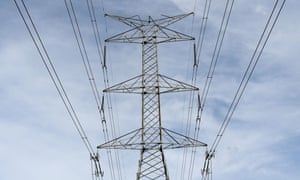Extract from The Guardian
Firms question if government has the right to use so-called ‘big
stick’ powers of divestiture as it races to try to lower prices before
an election
Australia’s major electricity companies have raised questions about
whether the Morrison government has the legal authority to proceed with
its so-called “big stick” threat to break up companies for price
gouging, and to impose the regulation of power prices.
The commercial law firm Ashurst has provided advice to the Australian Energy Council, which represents 22 major electricity and gas firms, saying there are concerns about the “framing and constitutionality” of the Morrison government’s measures intended to force price relief for consumers and business.
The legal advice revealed on Tuesday says if the government intends to proceed with what amounts to “quasi-judicial” interventions, such as imposing price regulation, requiring generators to contract with third parties, and forcing divestment, then the power should be exercised independently of ministers “so that the decision-making process is not influenced by the potential for political interference, or the appearance of political interference”.
In relation to divestiture powers – the much vaunted “big stick” powers – the advice notes there are precedents in Commonwealth legislation.The commercial law firm Ashurst has provided advice to the Australian Energy Council, which represents 22 major electricity and gas firms, saying there are concerns about the “framing and constitutionality” of the Morrison government’s measures intended to force price relief for consumers and business.
The legal advice revealed on Tuesday says if the government intends to proceed with what amounts to “quasi-judicial” interventions, such as imposing price regulation, requiring generators to contract with third parties, and forcing divestment, then the power should be exercised independently of ministers “so that the decision-making process is not influenced by the potential for political interference, or the appearance of political interference”.
But it says breaking up companies could force fire sales, “a process that may not necessarily appropriately compensate it for the value of the assets”.
While the new energy minister, Angus Taylor, has been attempting to cajole the sector into concrete action on price relief that can be delivered before the Morrison government goes to the polls in the first half of next year, the new submission from the industry makes it clear there is major pushback.
The companies blast the proposed regulatory measures, saying they “introduce unnecessary duplication to existing laws, create uncertain obligations on whether or not behaviour is prohibited conduct and create an unpredictable enforcement regime which will negatively impact competition and investment”.
The submission says the energy sector accepts that change to the regulatory frameworks is required to serve the interests of consumers, but it says the new penalty regime proposed by the Morrison government will not encourage investment, improve competition, or lower prices.
The pushback from the energy sector doesn’t stop at price regulation and divestiture. There is also intense criticism of a separate government proposal to underwrite investments in generation, and potentially indemnify new coal generation against the future risk of a carbon price.
The power companies contend the government intends to “hurriedly underwrite new generation through a form of government tender”, in the process handing a subsidy to a successful generator, and making long-term competitive supply to customers “a secondary consideration”.
Taylor said on Monday night: “After years of taking record profits at the expense of consumers, it is unsurprising that the big energy companies are desperate to avoid any measures that would see a better deal for Australian families and businesses.
“The government is preparing a comprehensive legislative package to hold the big energy companies to account and stop the ripoffs. The ‘big stick’ legislative package will be introduced to Parliament in coming weeks.”
The companies’ submission says the government proposal is a radical departure from a concept initially proposed by the Australian Competition and Consumer Commission, and predicts tenderers “will most likely not bother to secure market customers until after they have succeeded obtaining a subsidy at government tender”.
A similar theme is picked up by the Clean Energy Council, an organisation that represents solar, wind, hydro, bioenergy, marine and geothermal energy companies, energy efficiency companies and more than 5,600 solar installers.
It characterises the government’s proposal as “a high-risk strategy that creates a market distortion that could have the opposite outcome to the one intended”.
In a separate submission to treasury, the organisation says it is concerned that the government intends to support ageing coal plants as part of the program, which goes against the original advice from the ACCC.
It points out that the Morrison government wants to set up the underwriting proposal in only a couple of months, which it says is insufficient time.
The Clean Energy Council points explicitly to the unstable political environment, and advises the government to wait until after the next federal election. “It is our strong view that this policy, the collapse of the development of the national energy guarantee and the political reality that Australia has had a recent leadership change and a federal election is impending represent too much risk to investors in the energy sector”.
“As a minimum, any progress on a government program should occur after the upcoming federal election,” the submission says.
The government has been pursuing measures to try to bring down power bills before the next election, but is on the back foot due to convolutions in energy policy that helped fuel the conservative-led leadership coup against Malcolm Turnbull.
On pricing, the government is intent on pursuing regulatory changes such as introducing a default market offer for energy prices for households and small businesses by next July. With election timing front-of-mind, the government has demanded the companies lower the cost of their standard offers by 1 January in preparation for the new regime.

No comments:
Post a Comment